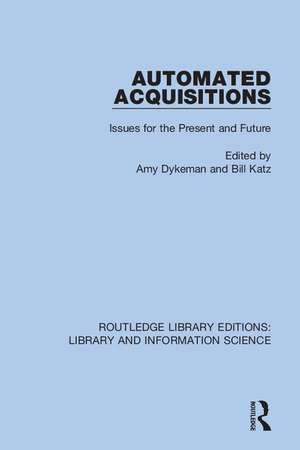Automated Acquisitions: Issues for the Present and Future: Routledge Library Editions: Library and Information Science
Editat de Amy Dykeman, Bill Katzen Limba Engleză Paperback – 15 dec 2021
| Toate formatele și edițiile | Preț | Express |
|---|---|---|
| Paperback (1) | 328.74 lei 6-8 săpt. | |
| Taylor & Francis – 15 dec 2021 | 328.74 lei 6-8 săpt. | |
| Hardback (1) | 680.73 lei 6-8 săpt. | |
| Taylor & Francis – 12 dec 2019 | 680.73 lei 6-8 săpt. |
Din seria Routledge Library Editions: Library and Information Science
- 52%
 Preț: 473.94 lei
Preț: 473.94 lei - 34%
 Preț: 429.45 lei
Preț: 429.45 lei - 36%
 Preț: 523.07 lei
Preț: 523.07 lei - 36%
 Preț: 599.64 lei
Preț: 599.64 lei - 36%
 Preț: 600.38 lei
Preț: 600.38 lei - 36%
 Preț: 525.02 lei
Preț: 525.02 lei - 39%
 Preț: 680.73 lei
Preț: 680.73 lei - 36%
 Preț: 523.64 lei
Preț: 523.64 lei - 34%
 Preț: 387.56 lei
Preț: 387.56 lei - 36%
 Preț: 525.09 lei
Preț: 525.09 lei - 39%
 Preț: 680.73 lei
Preț: 680.73 lei - 34%
 Preț: 428.36 lei
Preț: 428.36 lei - 36%
 Preț: 523.80 lei
Preț: 523.80 lei - 37%
 Preț: 599.17 lei
Preț: 599.17 lei - 36%
 Preț: 523.71 lei
Preț: 523.71 lei - 37%
 Preț: 598.84 lei
Preț: 598.84 lei - 34%
 Preț: 387.56 lei
Preț: 387.56 lei - 39%
 Preț: 680.73 lei
Preț: 680.73 lei - 36%
 Preț: 601.19 lei
Preț: 601.19 lei - 36%
 Preț: 600.72 lei
Preț: 600.72 lei - 36%
 Preț: 523.88 lei
Preț: 523.88 lei - 34%
 Preț: 387.71 lei
Preț: 387.71 lei - 34%
 Preț: 524.29 lei
Preț: 524.29 lei - 39%
 Preț: 680.73 lei
Preț: 680.73 lei - 36%
 Preț: 524.45 lei
Preț: 524.45 lei - 37%
 Preț: 599.32 lei
Preț: 599.32 lei - 35%
 Preț: 524.20 lei
Preț: 524.20 lei - 37%
 Preț: 598.67 lei
Preț: 598.67 lei - 39%
 Preț: 680.73 lei
Preț: 680.73 lei - 34%
 Preț: 430.30 lei
Preț: 430.30 lei - 36%
 Preț: 600.38 lei
Preț: 600.38 lei - 36%
 Preț: 523.97 lei
Preț: 523.97 lei - 34%
 Preț: 428.44 lei
Preț: 428.44 lei - 37%
 Preț: 599.17 lei
Preț: 599.17 lei - 36%
 Preț: 599.41 lei
Preț: 599.41 lei - 34%
 Preț: 387.56 lei
Preț: 387.56 lei - 33%
 Preț: 600.54 lei
Preț: 600.54 lei - 36%
 Preț: 523.30 lei
Preț: 523.30 lei - 36%
 Preț: 525.76 lei
Preț: 525.76 lei - 34%
 Preț: 522.90 lei
Preț: 522.90 lei - 36%
 Preț: 524.03 lei
Preț: 524.03 lei - 37%
 Preț: 599.17 lei
Preț: 599.17 lei - 36%
 Preț: 525.43 lei
Preț: 525.43 lei - 36%
 Preț: 600.64 lei
Preț: 600.64 lei - 37%
 Preț: 598.74 lei
Preț: 598.74 lei - 34%
 Preț: 385.86 lei
Preț: 385.86 lei - 36%
 Preț: 526.01 lei
Preț: 526.01 lei - 36%
 Preț: 525.83 lei
Preț: 525.83 lei - 34%
 Preț: 386.12 lei
Preț: 386.12 lei - 36%
 Preț: 600.72 lei
Preț: 600.72 lei
Preț: 328.74 lei
Nou
Puncte Express: 493
Preț estimativ în valută:
62.90€ • 68.54$ • 53.01£
62.90€ • 68.54$ • 53.01£
Carte tipărită la comandă
Livrare economică 24 aprilie-08 mai
Preluare comenzi: 021 569.72.76
Specificații
ISBN-13: 9780367375515
ISBN-10: 0367375516
Pagini: 302
Dimensiuni: 156 x 234 x 16 mm
Greutate: 0.43 kg
Ediția:1
Editura: Taylor & Francis
Colecția Routledge
Seria Routledge Library Editions: Library and Information Science
Locul publicării:Oxford, United Kingdom
ISBN-10: 0367375516
Pagini: 302
Dimensiuni: 156 x 234 x 16 mm
Greutate: 0.43 kg
Ediția:1
Editura: Taylor & Francis
Colecția Routledge
Seria Routledge Library Editions: Library and Information Science
Locul publicării:Oxford, United Kingdom
Public țintă
Adult education, General, Postgraduate, Professional, and UndergraduateCuprins
1. Preface Bill Katz 2. Introduction Amy Dykeman 3. The Impact of Library Automation and Electronic Publishing: Toward Distributed Acquisitions Carol E. Chamberlain 4. Triangle Research Libraries Network: Planning for Automating the Acquisitions/Serials Control Functions Janet L. Flowers 5. Vendor Relations and Automation Marcia Anderson and Donald E. Riggs 6. Life in a Gold Fish Bowl: Or the Changing Nature of Acquisitions Work in an Integrated Online Environment Sally W. Somers 7. The Evolving Structure and Automation of Acquisitions Jessie T. Nicol 8. A Shared Acquisitions System: The Ties That Bind? Mary Ann Garlough 9. Automating Acquisitions at Auburn University Nancy Gibbs 10. Approval Acquisitions and the Integrated Online System Michael Kreyche 11. Bringing Up INNOVACQ: The Impact on the University of New Mexico General Library Harry C. Broussard, Marilyn P. Fletcher, Chris Sugnet and Connie C. Thorson 12. In-Process Control of Order Requests for ‘Out of Print’ and ‘Not Yet Published’ Materials Using the INNOVACQ Acquisitions System Stephen Bosch 13. The INNOVACQ and Geac Acquisitions Systems Compared: A Large Academic Library Perspective Carol Pitts Hawks 14. Ideal and Reality: Automating Acquisitions in a Time of Austerity Heather S. Miller 15. Going On-Line With the Geac Acquisitions System: Converting 1970's Clerical Procedures to 1980's Technology Robert N. Thompson 16. Automated Acquisitions in an Integrated Online System Pauline J. Iacono 17. Acquisitions: The Wonders of Automation Jeanne Harrell 18. Microcomputer Based Inhouse Acquisitions Program Helen M. Shuster 19. In Pursuit of Shared Access to the CD-ROM, Dialling Books in Print Plus Julie Nilson, Jon LaCure and Anne McGreer 20. Microcomputer-Based Acquisitions Systems: Where Have We Come From; Where Are We Going? Norman Desmarais
Descriere
In this book, first published in 1989, practicing librarians share their hands-on experience with implementing various types of acquisitions systems and address planning considerations, the blurring of roles between acquisitions and cataloguing, staffing implications, and electronic record transmission.
